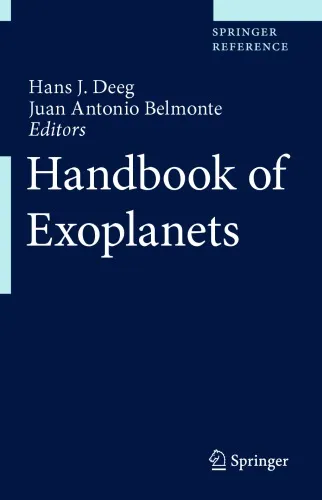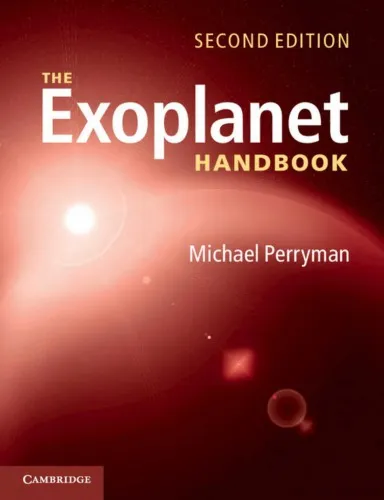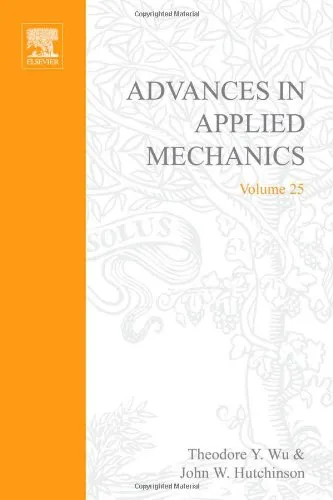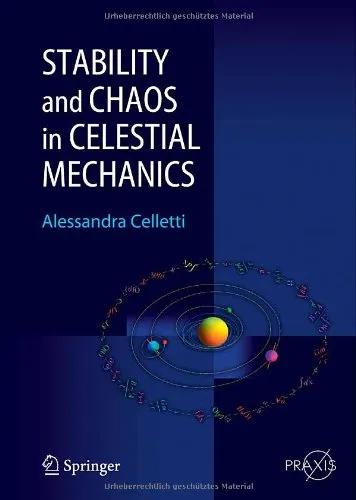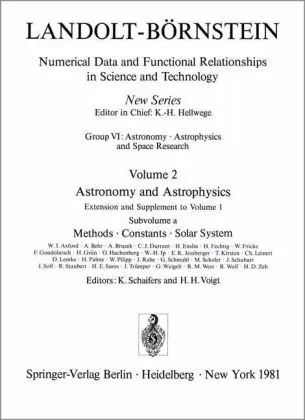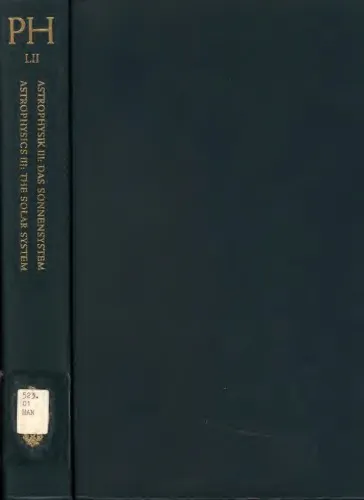Handbook of Exoplanets
4.0
بر اساس نظر کاربران

شما میتونید سوالاتتون در باره کتاب رو از هوش مصنوعیش بعد از ورود بپرسید
هر دانلود یا پرسش از هوش مصنوعی 2 امتیاز لازم دارد، برای بدست آوردن امتیاز رایگان، به صفحه ی راهنمای امتیازات سر بزنید و یک سری کار ارزشمند انجام بدینکتاب های مرتبط:
معرفی جامع به کتاب "Handbook of Exoplanets"
کتاب "Handbook of Exoplanets" یکی از جامعترین و معتبرترین منابع در زمینه سیارات فراخورشیدی (Exoplanets) است که توسط نویسندگان برجسته، «Hans J. Deeg» و «Juan Antonio Belmonte» تهیه شده است. این کتاب مجموعهای از مقالات پژوهشی، یافتهها و تحلیلهای علمی در زمینه مطالعه سیاراتی است که خارج از منظومه شمسی ما قرار دارند. با توجه به تقاضای روزافزون برای اطلاعات دقیق و بهروز در مورد این حوزهی هیجانانگیز، این کتاب بهعنوان یک منبع حیاتی برای ستارهشناسان، فیزیکدانان، و حتی عموم علاقهمندان به فضاشناسی، بسیار مورد توجه قرار گرفته است.
خلاصه کلی کتاب
کتاب "Handbook of Exoplanets" شامل بیش از هزار صفحه اطلاعات جامع و پیشرفته در مورد کشف، مطالعه، و تحلیل سیارات فراخورشیدی است. این کتاب در قالب چندین بخش تنظیم شده است که هر یک موضوعات کلیدی در تحقیقات علمی سیارات فراخورشیدی را پوشش میدهد. از روشهای کشف و شناسایی این سیارات گرفته تا مدلسازی جوّهای آنها و بررسی قابلیتهای سکونت در این دنیاها، هر بخش بهصورت تخصصی نوشته شده و توسط پژوهشگران معتبر در این زمینه ارائه شده است.
این کتاب ابزارهای جدیدی برای درک عمیقتر دینامیک سیستمهای سیارهای فراهم میآورد و همچنین چالشها و آینده پژوهش در زمینه Exoplanets را مورد بحث قرار میدهد. تمامی فصلها با تمرکز بر دادههای تجربی اخیر و پیشبینیهایی مبتنی بر مطالعات عملی و نظری تدوین شدهاند.
نکات کلیدی مطرح شده در کتاب
- توضیح دقیق تکنیکهای کشف سیارات فراخورشیدی مانند روش Transit و Spectroscopy.
- مطالعه و مدلسازی جو سیارات فراخورشیدی و بررسی ترکیبات شیمیایی آنها.
- تحلیل پارامترهایی که قابلیت سکونت (Habitability) را تعیین میکنند.
- آینده فناوریها و ابزارهایی که در مطالعات این حوزه بهکار گرفته خواهند شد.
- ارتباط میان سیارات فراخورشیدی و نظریههای کلی در فیزیک و کیهانشناسی.
نقلقولهای مشهور از کتاب
"The discovery of exoplanets is not only an astronomical milestone; it is a cultural turning point for humanity."
"Exploration beyond our solar system pushes the boundaries of our imagination and science simultaneously."
چرا این کتاب اهمیت دارد؟
به عنوان یکی از پرچمداران در عرصه مطالعه سیارات فراخورشیدی، کتاب "Handbook of Exoplanets" بهدلیل محتوای جامع و راهبردی، برای هر محققی در این حوزه اساسی است. این کتاب، نهتنها فناوریها و روشهای اجرایی حال حاضر را روشن میکند، بلکه چشمانداز آینده علم ستارهشناسی و چالشهای پیشرو را نیز مطرح میسازد. اهمیت این کتاب در تاثیراتی که بر علم، فلسفه، و حتی درک ما از جایگاه انسان در کیهان دارد، خلاصه میشود.
Introduction to the Handbook of Exoplanets
The Handbook of Exoplanets is an extensive scientific compendium that explores one of the most captivating and rapidly evolving fields of astronomy: exoplanetary science. Edited by renowned experts Hans J. Deeg and Juan Antonio Belmonte, this book is an invaluable resource for researchers, students, and enthusiasts alike who seek to understand the incredible diversity of worlds beyond our Solar System. From the discovery of the first exoplanet to the cutting-edge technologies and methodologies shaping the field today, this book offers a comprehensive guide to the revolution in our understanding of planetary systems and the possibilities for life elsewhere in the universe.
The discovery of exoplanets has transformed modern astrophysics and planetary science. This book acts as a crucial reference point for anyone looking to gain insight into the many challenges and achievements in this domain. It highlights both the historical context and potential future breakthroughs, making it both timeless and forward-looking.
Detailed Summary of the Book
The Handbook of Exoplanets is structured to provide readers with a well-rounded understanding of the subject. It encompasses detailed discussions on the detection methods, formation, and dynamics of planetary systems, the characterization of exoplanetary atmospheres, and the search for biosignatures and habitability. The book serves as a repository of state-of-the-art scientific knowledge, offering clear explanations and insights for professionals while also being accessible to non-specialists with an interest in this fascinating area.
Some of the critical topics addressed in the book include:
- The history and evolution of exoplanet discovery techniques.
- A thorough examination of radial velocity, transit photometry, direct imaging, and other methods of exoplanet detection.
- Discussions on the emergent field of atmospheric studies and the technology enabling it, such as space telescopes and spectroscopic tools.
- An in-depth look at planetary system architecture, origin theories, and migration patterns.
- The role of habitability studies in identifying potentially life-supporting planets.
- Important cultural and philosophical implications of exoplanet exploration.
By expertly blending technical rigor with readability, the book encourages curiosity, fosters deeper understanding, and serves as a critical resource for academic and practical learning in the field of exoplanets.
Key Takeaways
The Handbook of Exoplanets delivers numerous fascinating insights that readers will carry with them:
- Exoplanets are ubiquitous, ranging from Earth-like terrestrial planets to massive gas giants, and each discovery further reshapes our understanding of the cosmos.
- Understanding the diverse mechanisms that govern planetary formation opens new avenues of research into the origins of planets, including our own.
- The detection of biosignatures in exoplanetary atmospheres could offer humanity its first evidence of extraterrestrial life.
- Exoplanetary research requires collaborative innovation, merging observational astronomy, theoretical physics, and planetary science with cutting-edge technology.
- Exoplanet exploration has philosophical and societal impacts, challenging our worldview and redefining humanity's place in the universe.
Famous Quotes from the Book
Here are a few notable quotes that capture the essence of the Handbook of Exoplanets:
"Each new exoplanet discovered is a piece in the grand puzzle of the cosmos, revealing the extraordinary diversity of planetary systems." — Hans J. Deeg
"The study of exoplanets reveals not only the multitude of worlds out there but also the profound uniqueness of our own." — Juan Antonio Belmonte
"To search for habitable worlds is to pursue humanity's eternal question: Are we alone?" — Contributing Author
Why This Book Matters
The significance of the Handbook of Exoplanets cannot be overstated. Exoplanetary research is at the frontier of astronomy and holds immense promise for answering some of the most profound questions about existence and the universe. This volume plays a crucial role in distilling decades of research into a single source, offering readers not only a complete understanding of current developments but also inspiration for the future.
The book acts as a hub for collaboration across disciplines, uniting experts in observational techniques, computational analysis, and theoretical models. It provides direction to those striving to advance the exoplanetary field further while serving as an enduring educational resource for students and enthusiasts.
Above all, it reshapes how humanity sees itself in relation to the cosmos. By highlighting the rich diversity of worlds beyond Earth, the Handbook of Exoplanets encourages us to look outward with wonder, curiosity, and a renewed drive to explore.
دانلود رایگان مستقیم
شما میتونید سوالاتتون در باره کتاب رو از هوش مصنوعیش بعد از ورود بپرسید
دسترسی به کتابها از طریق پلتفرمهای قانونی و کتابخانههای عمومی نه تنها از حقوق نویسندگان و ناشران حمایت میکند، بلکه به پایداری فرهنگ کتابخوانی نیز کمک میرساند. پیش از دانلود، لحظهای به بررسی این گزینهها فکر کنید.
این کتاب رو در پلتفرم های دیگه ببینید
WorldCat به شما کمک میکنه تا کتاب ها رو در کتابخانه های سراسر دنیا پیدا کنید
امتیازها، نظرات تخصصی و صحبت ها درباره کتاب را در Goodreads ببینید
کتابهای کمیاب یا دست دوم را در AbeBooks پیدا کنید و بخرید
1601
بازدید4.0
امتیاز0
نظر98%
رضایتنظرات:
4.0
بر اساس 0 نظر کاربران
Questions & Answers
Ask questions about this book or help others by answering
No questions yet. Be the first to ask!
